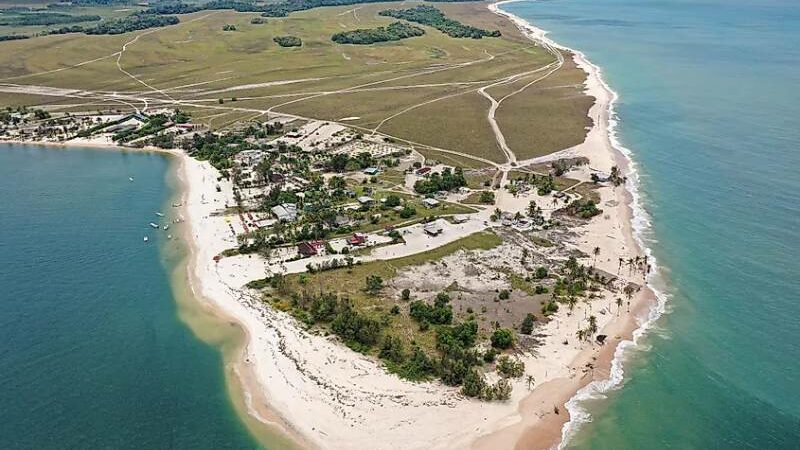Gabon
The name Gabon is derived from the Portuguese word Gabao, meaning “cloak,” shaped like the mouth of the Como River in Libreville. French is the official and main language of the Gabonese people. However, Fan is also the common mother tongue of around 30% of Gabonians.
Gabon is located on the Atlantic coast of Central Africa, bordering Equatorial Guinea, Cameroon, and the Republic of Congo. Gabon is home to many tribes, most of whom speak Bantu languages.
Gambia
The official name of The Gambia is derived from the Mandinka word “Kambaa”, which refers to the Gambia River. The Gambia River flows through the center of the country and empties into the Atlantic Ocean.
The Gambia’s only land border is with neighboring Senegal, which completely surrounds the Gambia. Banjul is the capital of Gambia. The Gambia, like most African countries, is made up of dozens of ethnic groups. The Diora, Malinke, Wolof and Fulani are the four largest tribes in The Gambia.
Georgia
Although not clear to many etymologists, the name Georgia is said to derive from the term “gurğān”, which was widely used by the Persians to refer to Georgians in the 11th and 12th centuries.
Georgia is located in the Caucasus region of Eurasia. Georgia’s capital is Tbilisi, which is also its largest city. George’s people call themselves Kartveli. Georgia is almost homogenous, but there are significant ethnic minorities: Russians, Azerbaijanis, Persians, and Armenians.
Germany
The English name of Germany is derived from the Latin word “Germania”. This name was given to the country by none other than Julius Caesar during his conquest in the 1st century BC. Germans themselves also call their country “Germany”.
Germany is located in the heart of Central Europe and remains a powerhouse in the European Union. One of the wealthiest countries on earth, Germany has long been a destination for other Europeans seeking better opportunities and greener pastures.
Ghana
Ghana is a word that means “warrior king” in the Soninke language. This term referred to the king of the Ghanaian Empire during the Middle Ages. Ghana was the first sub-Saharan country to gain independence from its suzerainty in 1957.
Ghana is one of the most influential countries in West Africa, with an impressive economy and a large population relative to its size. Ghana is very multi-ethnic, but the Akan people make up the majority, making up almost 50% of the total population.
Greece
The Greek name for Greece is Hellas. The name Greece comes from the Latin word “graecia”, which the Romans used to describe the land occupied by the Greeks. This Latinized name is the origin of modern Greek names in most languages.
Greece is located in the south of the Balkan Peninsula. The Greek people and their culture are considered one of the world’s oldest peoples, and are often thought to have created what would become known as Western culture as early as the Bronze Age.
Grenada
Grenada is often referred to as the “Spice Island” due to its abundant production of nutmeg and mace flowers. The origin of the name Grenada is unclear, but most historians believe that the island was named by Spanish sailors and explorers after the Spanish city of Granada.
Grenada is located in the Caribbean Sea in the north of South America. The island’s population is largely African, descendants of slaves brought over by European powers to grow sugar cane and tobacco. Grenada was under French and British rule for centuries before finally gaining independence in the 1970s.
Guatemala
The name “Guatemala” comes from the Nahuatl word “Cauuhtēmallān,” meaning “place of many trees.” Specifically, it refers to an area with lots of cute trees. Despite being under Spanish rule for a long time, Guatemala still values its indigenous culture.
Guatemala is a small country in Central America bordering Mexico, Belize, Honduras, and El Salvador. Guatemala’s population is incredibly diverse, with a large pre-Columbian population. The majority of Guatemalans are considered mestizos, meaning people with mixed Spanish and indigenous backgrounds.
Guinea
The English name “Guinea” is of Portuguese origin and refers to the African people who lived along the Senegal River. Guinea was formerly known as French Guinea. It is also called Guinea-Conakry to distinguish it from Equatorial Guinea and Guinea-Bissau.
Guinea is located on the Atlantic coast of West Africa. It borders the other countries, Guinea-Bissau, Sierra Leone, Liberia, Senegal, Ivory Coast, and Mali. What may come as a surprise to some is that Guinea is a Muslim-majority country, with almost 90% of the population practicing Sunni Islam.
Guinea-Bissau
Formerly known simply as Guinea, Bissau was added to the name Guinea to distinguish it from French Guinea. He first came into contact with the Portuguese in what would become Guinea-Bissau in the 15th century. Despite this relationship with the Portuguese, the area eventually fell under French control in the 19th century.
Guinea-Bissau is also located on the Atlantic coast of West Africa, bordering only Guinea and Senegal. Its religious composition is more diverse than its southern neighbor, with the majority of the population practicing Christianity, Islam, and traditional animism.
Guyana
Guyana is officially known as the Cooperative Republic of Guyana, and the name Guyana is derived from the Indian word “guyana” meaning “land of many waters.” Guyana is located at the northern tip of South America, along with Venezuela, Brazil, and Suriname.
Guyana has some of the most unique demographics in the Americas. Guyana is home to a large Indian population, whose ancestors came to the region as indentured servants. As a result, almost a quarter of Guyanese are Hindu, with the remainder belonging to other Christian denominations.
There are 11 countries on earth that start with G. Although they all start with the same letter, many G’s are pronounced very differently.
These countries are all over the world. Some of these countries are located in Asia, South America, Europe, and North America. Each of these countries has its own unique flavor of culture, food, and history.





